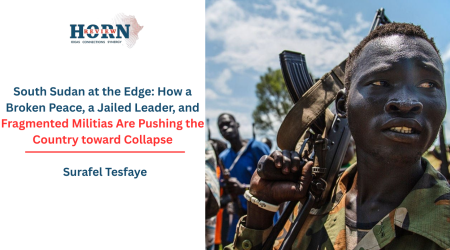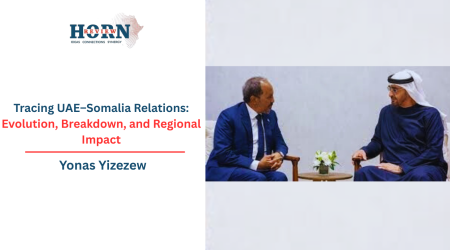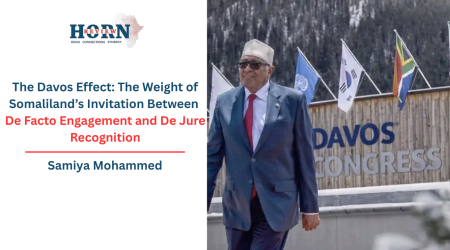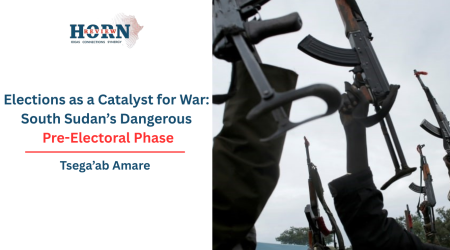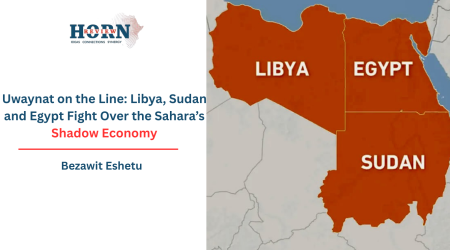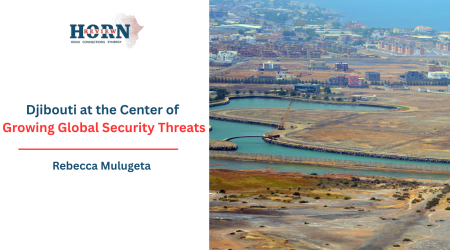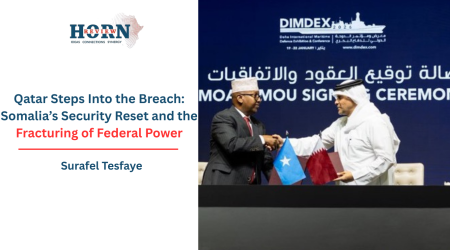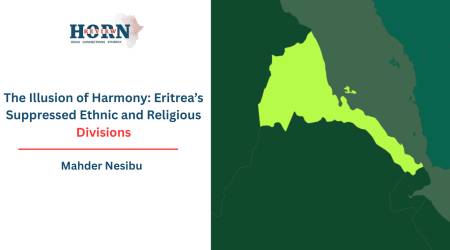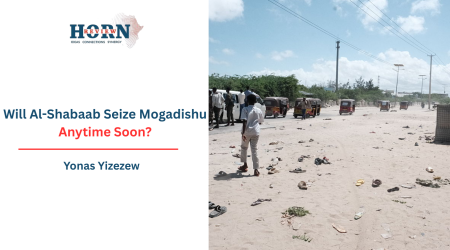
20
Feb
Egypt’s Geopolitical Tightrope: Trump’s Gaza Ultimatum, Arab League Backlash, and the Cost of Declining Regional Clout in the Greater Horn
Trump’s Ultimatum on Gaza is a test for Cairo’s balancing act. Over the past few months, Egypt has found itself in a complex geopolitical landscape, and the Egyptian regime has had to navigate the controversial proposals made by United States President DonaldTrump regarding the Gaza Strip. The ramifications of these events reshape the region, as Egypt has always been the backbone of Arab politics. Trump’s plan, as reported here, would be seen to involve displacing roughly 1.8 million Palestinians who now live in Gaza,a proposal that has been broadly denounced. Egyptian President Abdel Fattah el-Sissi and the king of Jordan, Abdullah II, have both come out against it explicitly, saying such a plan would violate Palestinians’ rights and international law.
Eventually, the Egyptian Foreign Ministry added its statement about what it called “new and dangerous developments” regarding the Palestinian cause. It announced an emergency Arab summit on Feb. 27, 2025, to discuss Trump’s ultimatum. This summit is intended to bring Arab states together to reject resettlement and to share plans for solidarity with Palestinian rights.”
At the time that the Trump administration published its so-called “Peace to Prosperity” plan in 2020, it included an implicit ultimatum to Egypt: Push Hamas to accept U.S.-brokered terms for Gaza or face a freeze in military aid. As one analysis put it in Foreign Policy, Cairo had a dual challenge of preserving its annual $1.3 billion of U.S. security assistance while fending off domestic backlash if it was seen to capitulate to Israeli and American demands. Facing economic fragility, President Abdel Fattah el-Sisi’s regime chose strategic ambiguity. Egypt stepped up border security efforts to prevent smuggling of Hamas weapons, a move that drew praise from both Tel Aviv and Washington but was condemned by Palestinian factions. This realpolitik was, however, tiring Egypt’s traditional role as an Arab mediator and revealing its waning influence in a profoundly polarized region.
Egypt’s alignment with U.S. and Israeli priorities has aggravated tensions within the Arab League. In 2021, an Arab Weekly report noted Cairo’s isolation in talks of Syria’s readmission, where Gulf states, particularly the United Arab Emirates, challenged Egyptian objections. The League’s muted response to Ethiopia’s Grand Ethiopian Renaissance Dam(GERD), an existential threat to Egypt’s Nile-dependent economy, further underscored Cairo’s diminished clout. Once the League’s de facto leader, Egypt now confronts a Saudi-Emirati axis which, though it agreed on the need to isolate Iran, prioritizes economic diversification and wartime pragmatism over pan-Arab solidarity. This was most clearly illustrated in 2023, when Gulf states ignored Egyptian pleas to speed up normalization agreements with Damascus, effectively leaving Cairo’s security-focused approach to the Syrian conflict out in the cold.
The GERD dispute is among the most precise indicators of Egypt’s diminishing clout in the Greater Horn. Despite years of tripartite negotiations with Ethiopia and Sudan, Cairo did not obtain binding guarantees on shares of Nile water. A 2022 International Crisis Group report highlighted Ethiopia’s intractability, encouraged by Chinese and Turkish investments that made Addis Ababa less dependent on Egyptian beneficence. Ethiopia’s utilization of multi polar partnerships, including BRNS (Brazil, Russia, India, China, and South Africa), helped gain political support and dovetailed with Egypt’s dependence on America, as well as AU mediation in 2015 when it sidelined Ethiopia with its allies. Sudan’s post-Bashir instability, in turn, hampered Egypt’s efforts to mobilize a united downstream front. Cairo’s recent arms deals with Uganda and Burundi, as part of its arcane effort to counter Ethiopia’s hydro aggression and desperate peripheral alliances, amounts to a last-ditch shift to second-order alliances. Still, these do not have the strategic intensity to change the GERD deadlock.
Egypt’s interventions in Sudan’s civil war show the risks of overreach. Cairo backed General al-Burhan’s Sudanese Armed Forces (SAF) against the UAE-backed Rapid Support Forces (RSF), hoping to installa regime in Khartoum more amenable to Egyptian interests. However, the 2023 Carnegie Endowment paper finds that UAE’s financial strength and Russia’s Wagner Group links to the RSF have pushed Egypt’s influence aside. Likewise, Egypt’s support for President Mohamud against Turkish and Qatari-backed factions in Somalia has produced modest dividends. Ankara’s billions in port investments and military training missions in Mogadishu dwarfs or eclipse Europhobia-style aid from Egypt, exposing Cairo’s inability to compete with resource-rich rivals at a time when new powers are reshaping Horn politics.
Saudi and Emirati leadership of emerging Red Sea security initiatives, including the Council of Ara band African Coastal States, has further marginalized Egypt. Riyadh’s $10 billion investments in NEOM and Sudanese agribusiness are straining Egypt’s long-standing Red Sea hegemony. Though Cairo was offered a $35 billion United Arab Emirates deal for the Ras al-Hekma port in 2023, Al-Monitor reported that the apparent lifeline comes with conditions: tighter Emirati oversight over Egyptian fiscal policy. Such dependency belies Egypt’s vulnerability, a rentier state ever more dependent on Gulf patrons, even as it sought toassert autonomy in multilateral forums.
Egypt’s non-alignment rhetoric instead sounds hollow amid galloping U.S.-China rivalry. As it courts Beijing for loans for infrastructure and Moscow for wheat supplies,Cairo still finds itself tethered to Western financial institutions. That’s only deepened public disaffection with austerity measures tied to the IMF’s $3 billion bailout, undercutting Sisi’s room for bold regional moves. Meanwhile, Turkey’s growing naval footprint in the Red Sea and Israel’s entry into AFRICOM architectures further exacerbate Egypt’s strategic trepidation. As the Brookings Institution study points out, Egypt’s failure to articulate its vision coherently other than mere regime survival risks leaving Cairo increasingly consigned to geopolitical irrelevance in a rapidly shifting multi polar order.
Egypt’s choices are simple: re calibrate its foreign policy to address structural economic weaknesses and regain lost confidence in Arab and African spheres,or face a diminished role in a future where both regional adversaries and allies alike craft the future of the Greater Horn. The price tag of inaction hydro insecurity, a withered foreign relations posture, and chronic clientelism hold risks for regional influence and national stability.
Egypt faces domestic pressures, such as popular discontent with its economy, and some issues, such as human rights, that have affected its international image. These factors have made Egypt’s foreign policy more complex, and the decisions to be made in the coming weeks will shape the region for a long time. To regain its position of leadership in the Arab World, Egypt must conduct itself as a proactive diplomatic actor, take on critical challenges at the national level, and strive to build consensus among Arab states for the support of Palestinian rights as well as national sovereignty.
By Surafel Tesfaye, Horn Review,Researcher


